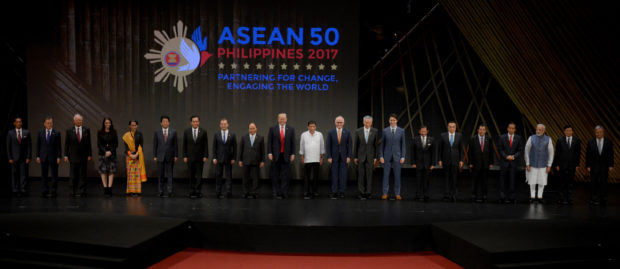
All leaders of the 31st Asean make a traditional photo ops during the opening of the 31st Asean Summit and Related Summits held at the Cultural Center of the Philippines. (Asean contributed photo)
A group of socio-civic organization leaders from various countries in Southeast Asia has called the regular Association of Southeast Asian Nation (Asean) Summit as “severely limited” as it failed to address the real problems of the Southeast Asian nations and foster “genuine participation” of people from the region.
In a press conference in a restaurant in Quezon City Tuesday, the Asean Civil Society Conference/Asean People’s Forum (ACSC/APF) called on for a more people-centered and “social” Asean.
Members of the civic group Asean Civil Society Conference/Asean People’s Forum (ACSC/APF) join hands to call on for a more people-centered and “social” Asean. INQUIRER / Jodee A. Agoncillo
“For 50 years, genuine people’s participation in the Asean has been severely limited. Despite the civic organization’s efforts to initiate engagements for constructive dialogues alongside Asean’s claims of having more inclusive and meaningful spaces, Asean remains largely inaccessible to people,” said Jelen Paclarin, chair of the ACSC/APF Regional Steering Committee.
Paclarin said the Asean summit should make people’s organizations and social movements as partners, and not exclude them.
READ: 20 world leaders attending 31st Asean Summit
“Asean is for us. Asean is for the Southeast Asian people. Build capacity on people empowerment instead of holding 1,000 meetings every year. Prioritize people’s agenda,” she said, stressing the “yawning gap between the richest Asean member-states and those still in early stage of development.”
Dr. Eduardo Tadem, of the Philippine National Organizing Committee, noted that the Asean Summit often dealt mostly about businesses, such as how to increase exports and trade.
The “Asean is basically an organization of the Asean nations’ political oligarchies and big corporations that exclude the 99 percent of the people in the Asean. They make decisions for themselves,” Tadem said.
He adds: “What is missing (in the Asean) are the people of Asean, those marginalized, those excluded in the development process that have been going on in Asean for the past 50 years…the workers, the peasants, fisher folks, women, LGBTQ, these basic sectors have been excluded.”
Soe Min Than of Singapore said the current Asean member state’s current emphasis is not on issues related to human rights violations and those affecting the marginalized communities.
Than, who also organizes the ACSC/APF in Singapore next year, noted the need to ensure policies are based on regular consultation with all stakeholders.
Tadem said the very few times Asean consulted with civic society groups were in a “very meaningless manner.”
“The many years the civil society groups have been engaging in the Asean process have been fruitless. They have not resulted in any basic change, or any genuine recognition of the role of civil society organizations in the Asean process,” Tadem said.
“It’s just a token process of supposedly talking, dialoguing but they never really attend, respond properly to the issues and demands of the civil society groups for the past 12 years or so. It is very frustrating process of engagement…of the Asean process,” he added.
Rachel Arini of Forum-Asia and Sumitha Kishna of Malaysia also confirmed the observation saying there has been a “systematic exclusion” of socio civic groups from the Asean Summit and process.
“The root cause of the problem should be taken from bottom up,” Arini said.
“Any economic development without consideration of human rights is bound to nothing,” said Joyce Godio of the Asia Indigenous People Act.
Commenting on an Inquirer front page which reports about a landmark pact signed during the Asean Summit on the migrant workers issue, Tadem said the deals inked during the summit are non-binding and any country can opt out of it since these are still subject to the laws of each country.
READ: Asean to sign ‘landmark’ agreement to protect rights of migrant workers
“It’s something that might look good on paper, but not on actuality,” he said, citing the several (unimposed) labor-contractualization laws in the Philippines.
After the four day conference, the group came up with 10 recommendations for the Asean nations.
Among these are the inclusion of a social dimension to the Asean integration, with emphasis of human rights of marginalized sectors; review of the Asean principle of non-interference and advance democracy and democratic decision-making in the Asean, prioritization of people’s agenda over corporate agenda and respect for struggles of collective resistance.
On Monday evening, around 1,000 members and supporters of the group marched to the People Power Monument to protest human rights atrocities, such as those faced by the Rohingyas in Myanmar, the breakdown of the rule of law and unjust and inequitable economic policies in the region. /jpv